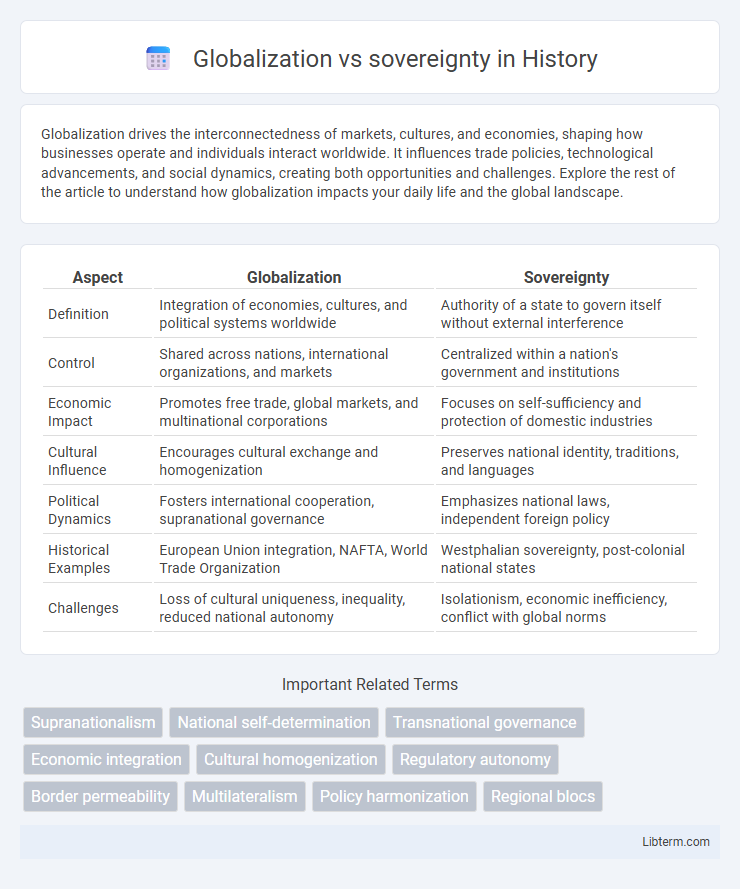Globalization drives the interconnectedness of markets, cultures, and economies, shaping how businesses operate and individuals interact worldwide. It influences trade policies, technological advancements, and social dynamics, creating both opportunities and challenges. Explore the rest of the article to understand how globalization impacts your daily life and the global landscape.
Table of Comparison
| Aspect | Globalization | Sovereignty |
|---|---|---|
| Definition | Integration of economies, cultures, and political systems worldwide | Authority of a state to govern itself without external interference |
| Control | Shared across nations, international organizations, and markets | Centralized within a nation's government and institutions |
| Economic Impact | Promotes free trade, global markets, and multinational corporations | Focuses on self-sufficiency and protection of domestic industries |
| Cultural Influence | Encourages cultural exchange and homogenization | Preserves national identity, traditions, and languages |
| Political Dynamics | Fosters international cooperation, supranational governance | Emphasizes national laws, independent foreign policy |
| Historical Examples | European Union integration, NAFTA, World Trade Organization | Westphalian sovereignty, post-colonial national states |
| Challenges | Loss of cultural uniqueness, inequality, reduced national autonomy | Isolationism, economic inefficiency, conflict with global norms |
Defining Globalization and Sovereignty
Globalization refers to the increasing interconnectedness of economies, cultures, and political systems worldwide, driven by trade, technology, and communication advancements. Sovereignty represents a nation's autonomous authority to govern itself without external interference, maintaining control over its laws, policies, and borders. The tension between globalization and sovereignty arises as global integration challenges traditional state control and national decision-making.
Historical Context of Globalization and National Sovereignty
Historical globalization accelerated with the Age of Exploration in the 15th and 16th centuries, which expanded trade networks and cultural exchanges across continents, challenging traditional notions of national sovereignty. The rise of colonial empires redefined sovereignty by subordinating indigenous states to imperial powers, altering local governance and territorial control. The 20th century saw further globalization through international organizations like the United Nations and World Trade Organization, which introduced new layers of governance that often limited absolute state sovereignty in favor of global cooperation and economic integration.
The Economic Impact: Open Markets vs. National Control
Open markets driven by globalization foster economic growth through increased trade, foreign investment, and technological innovation, enhancing efficiency and consumer choice. National control emphasizes protecting domestic industries, preserving jobs, and maintaining economic stability by regulating trade policies and capital flows. Balancing globalization with sovereignty involves managing benefits from global integration while safeguarding local economic interests.
Political Implications for State Authority
Globalization challenges state sovereignty by shifting political authority from national governments to supranational institutions and multinational corporations, limiting traditional policymaking power. State authority is further constrained by international trade agreements and transnational regulatory frameworks that demand compliance beyond domestic legislation. Political implications include reduced autonomy in economic and security decisions, altering the balance between national interests and global governance.
Cultural Homogenization vs. Cultural Preservation
Globalization accelerates cultural homogenization by spreading dominant cultural norms, media, and consumer goods, often weakening local traditions and identities. Sovereignty efforts prioritize cultural preservation by promoting national languages, customs, and heritage to resist the erosion caused by global influences. Balancing these forces requires policies that safeguard cultural diversity while engaging with global economic and social networks.
Technological Advancements and Borderless Societies
Technological advancements have accelerated globalization by enabling seamless communication, digital trade, and cross-border data flows that erode traditional sovereignty boundaries. Borderless societies emerge as entrepreneurs, workers, and consumers engage globally through platforms like cloud computing, AI-driven marketplaces, and decentralized finance. Sovereign states face challenges in regulating data privacy, cybersecurity, and digital currencies, calling for new governance frameworks adapting national policies to transnational technological realities.
Global Institutions and the Erosion of Sovereignty
Global institutions such as the United Nations, World Trade Organization, and International Monetary Fund play a central role in shaping global governance, often imposing regulations that limit national policy autonomy. This dynamic leads to the erosion of sovereignty as states conform to international norms and agreements to participate in global economic and political systems. The balance between globalization and sovereignty remains a contentious issue as countries navigate the trade-offs between international cooperation and maintaining independent decision-making authority.
Case Studies: National Responses to Globalization
National responses to globalization vary significantly, with countries like China embracing economic integration through initiatives such as the Belt and Road while maintaining strict political sovereignty. In contrast, the United States has adopted a more protectionist stance, exemplified by trade tariffs and renegotiation of agreements like NAFTA into USMCA to safeguard domestic industries. The European Union represents a unique case, balancing supranational governance with member states' preservation of national sovereignty through policies fostering economic unity alongside cultural and legal diversity.
Challenges to Legal and Regulatory Autonomy
Globalization challenges legal and regulatory autonomy by facilitating cross-border economic activities that often require harmonized standards, undermining national laws. International agreements and multinational corporations exert pressure on governments to align regulations, limiting sovereign decision-making in areas such as trade, environmental policy, and labor rights. This erosion of control complicates the enforcement of domestic legal frameworks and raises concerns about maintaining jurisdictional authority in an interconnected world.
Balancing Global Integration with Sovereignty: Future Perspectives
Balancing global integration with national sovereignty requires adaptive governance frameworks that respect state autonomy while engaging in international cooperation. Emerging models emphasize multilateral agreements that protect domestic interests and promote sustainable economic growth without compromising regulatory independence. Future perspectives highlight the role of digital diplomacy and transnational networks in harmonizing global policies alongside sovereign priorities.
Globalization Infographic

 libterm.com
libterm.com